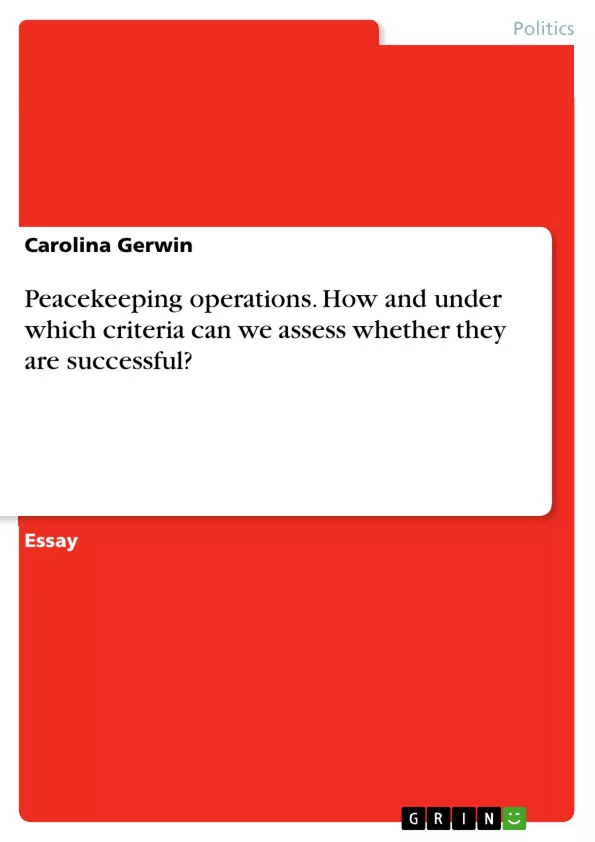Based on a case study analysis of the Mission des Nations Unies pour la stabilisation en Haiti (MINUSTAH), the essay answers the question of how and under which criteria one can assess whether peacekeeping operations are successful. The paper shows that while the criteria of short-term analyses are the most prominent ones in the literature, they are not universally applicable and that there is a need to establish common criteria for the assessment of peacekeeping missions that focus on the long-term consequences of such missions. Regarding the success of MINUSTAH, it is concluded that it was neither a (full) success for the UN nor for the Haitian population.
Since 1948 the UN has deployed more than seventy peacekeeping missions (UN Peacekeeping n.d.). Peacekeeping operations can be defined as operations, which were deployed with or without the compliance of belligerent parties, depending on international legislation and mandate to sustain and implement a peaceful environment impartially and without using combat arms, if not necessary.
Inhaltsverzeichnis (Table of Contents)
- Introduction
- Literature review
- Mandate
- Short-term analyses
- Long-term analyses
- Conclusion of the Literature Review
- Methodology
- Case selection
- Data selection
- Background chapter on MINUSTAH
- Research chapter on the success of MINUSTAH
- Short-term analysis
- Mandate and long-term analysis
- Stability
- Security
- Elections
- Political, economic, and social development
- Conclusion
Zielsetzung und Themenschwerpunkte (Objectives and Key Themes)
This research paper aims to examine the criteria used to assess the success of peacekeeping operations and apply those criteria to the case of the United Nations Stabilization Mission in Haiti (MINUSTAH) from 2004 to 2017. The paper challenges the universality of commonly used criteria, arguing that they are not always applicable and that a more comprehensive approach is needed, particularly focusing on long-term consequences of peacekeeping and positive peace.
- Assessment criteria for peacekeeping success
- The role of mandate fulfillment
- Short-term vs. long-term analyses of peacekeeping effectiveness
- The concept of positive peace and its relevance to peacekeeping operations
- The case of MINUSTAH as a special peacekeeping mission in a non-conflict context
Zusammenfassung der Kapitel (Chapter Summaries)
The paper begins with a comprehensive review of the existing literature on assessing the success of peacekeeping operations. It analyzes various criteria, including mandate fulfillment, short-term measures focused on conflict containment and security, and long-term perspectives emphasizing the broader goals of peacebuilding and development. The chapter also discusses the limitations of relying solely on short-term analyses and highlights the increasing importance of long-term considerations.
The methodology chapter outlines the case selection process and the data used in the study. It focuses on the specific characteristics of MINUSTAH as a peacekeeping mission that occurred in a non-conflict environment and seeks to address the limitations of using conventional criteria for assessment.
The background chapter provides an in-depth analysis of the context and circumstances leading to the deployment of MINUSTAH in Haiti, shedding light on the unique challenges and opportunities faced by the mission.
The research chapter delves into the application of the chosen criteria to the case of MINUSTAH. This section examines the mission's effectiveness in achieving its objectives and the extent to which it contributed to stability, security, elections, and broader development in Haiti.
Schlüsselwörter (Keywords)
The paper focuses on key terms such as peacekeeping operations, success criteria, mandate fulfillment, short-term analysis, long-term analysis, positive peace, peacebuilding, development, case study, MINUSTAH, Haiti, and conflict resolution. The research investigates the applicability of these concepts in assessing the success of peacekeeping missions in specific contexts, emphasizing the need for a nuanced approach that considers both immediate and long-term impacts.
- Citar trabajo
- Carolina Gerwin (Autor), 2019, Peacekeeping operations. How and under which criteria can we assess whether they are successful?, Múnich, GRIN Verlag, https://www.grin.com/document/510894



